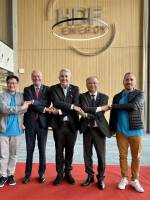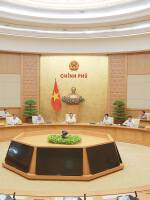
Vietnam’s renewable energy developers, especially those with projects located near industrial parks, economic zones and export processing zones, are likely to win big with the newly approved mechanism for direct power purchase agreement (DPPA), say analysts.
On July 3, the government issued Decree No. 80/2024/ND-CP on the DPPAs between renewable energy generators and large electricity consumers.
Analysts with broker Saigon Securities (SSI) say that the DPPA mechanism can encourage more investment in domestic renewable energy projects, thereby promoting environmentally sustainable development and improving efficiency of the power market in Vietnam.
The mechanism will create a better competitive environment for participants and has the potential to resolve state utility Vietnam Electricity’s (EVN) financial problems, they add.
They note that renewables play a key role in the roadmap drawn by the 2021-2030 National Power Development Plan (with vision until 2050), or PDP VIII.
The plan targets expanding power generation capacity to over 150,000 MW by 2030 and nearly 600,000 MW by 2050, contributing to the nation’s goal of achieving net zero emissions by 2050.
Encouraging renewable energy production, especially in the North, can solve or at least reduce significantly Vietnam’s electricity shortage problem in the long term; and the new mechanism will allow risk prevention through regulations on forward contracts, the SSI analysts say.
According to a study conducted by the Ministry of Industry and Trade at the end of 2023, out of 67 renewable power projects surveyed, 24 with a combined capacity of 1,773 MW wished to participate in the DPPA as sellers, while 17 others (2,836 MW) were considering participation. On the buyers’ side, 20 out of 41 respondents wanted to join the mechanism.
In the long term, SSI analysts expect the mechanism to be a first important step in the development of the Vietnam wholesale electricity market (VWEM) and the Vietnam retail electricity market (VREM).
Short-term challenges
However, implementing the DPPAs will face some short-term challenges including the need to maintain more stable power supply and develop power from the Battery Energy Storage System (BESS) to support national grid stability and reduce power losses.
The increase of renewable energy capacity as a result of DPPA implementation must be accompanied by more reasonable dispatch policies to address problems related to the national grid’s load capacity, as well as the development of more stable power sources for the grid, like gas/LNG-fueled power and deployment of BESS technology in power production.
As the DPPA mechanism is quite new, buyers and sellers may encounter difficulties in negotiating contracts due to the lack of guiding documents.
According to the analysts, REE Corporation (REE), Ha Do Group (HDG), Bamboo Capital (BCG), PC1 Group (PC1) and Gia Lai Electricity JSC (GEG) are some of the renewable energy developers that can benefit from the DPPAs.
REE which operates three wind power projects – Phu Lac 2, Loi Hai 2 and Tra Vinh V1-3, earned profits of VND201 billion ($7.91 million) in 2023, up 30% year-on-year. The group has also developed rooftop solar power with output at 134 million kWh. This source earned profits of VND39 billion ($1.53 million) last year.
REE chairwoman Nguyen Thi Mai Thanh has affirmed that renewable energy is a top priority in the group’s investment strategy.
Bamboo Capital’s energy arm, BCG Energy, has a project portfolio with a total capacity of 594 MW, including solar power farms and rooftop solar power installations. Last year’s the firm’s electricity output reached 654 million kWh, an increase of 13.1% over 2022.
In 2023, the company did not promote project development because the pricing mechanism and guiding documents for implementing the PDP VIII were still pending approval.
This year, BCG Energy has set ambitious goals for self-use rooftop solar power installations and accelerated progress of ongoing wind and solar power projects. The company also participates in building the world’s leading modern technology waste incineration plant in Ho Chi Minh City.
BCG Energy is also completing procedures to list its shares on the stock exchange. On May 20, the State Securities Commission issued an official document approving its registration as a public company.
The Ha Do Group has in the pipeline wind power projects with a total capacity of about 828 MW.
SSI analysts say that the PC1 Group can reap handsome benefits by taking advantage of its expertise in renewable energy installation and potential customers at industrial parks developed by itself and its affiliated companies.
Meanwhile, Gia Lai Electricity has two renewable energy projects in the pipeline – the 49MW Duc Hue 2 solar power plant and the 30MW VPL Ben Tre wind power plant – phase 2.
My Ha – Minh Hue




